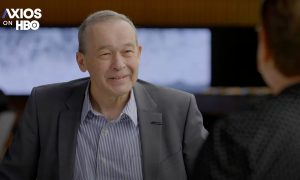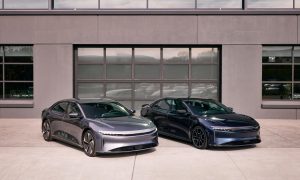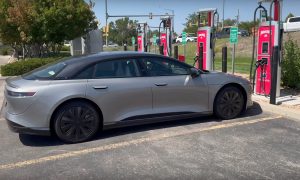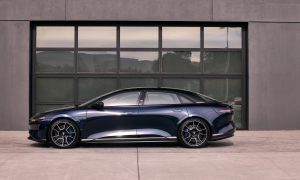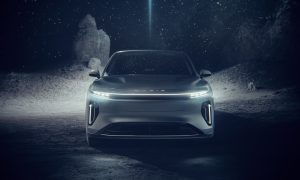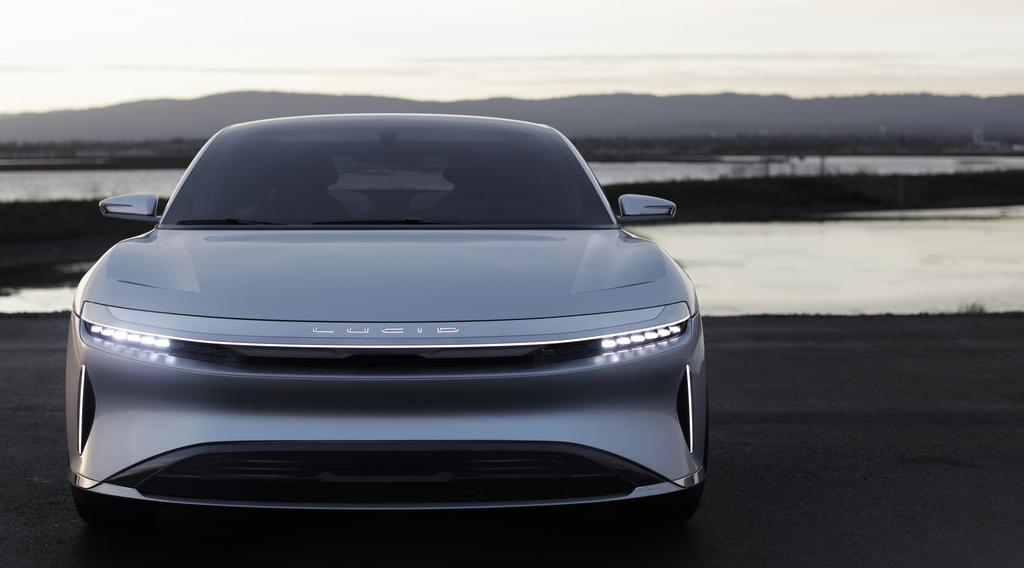

News
Land for Lucid Motors Arizona factory will reportedly be paid by tax payers
Officials in Pinal County, Arizona are considering ways to raise the money needed to purchase 500 acres of land near the city of Casa Grande where Lucid Motors intends to build its $700 million electric car factory. The proposed manufacturing facility was the subject of a high profile press event earlier this month that featured Arizona governor Doug Ducey. All parties acknowledge Ducey was a key player in landing the project for the state of Arizona.
There is only one problem with the deal — the taxpayers of Arizona are expected to pay for the purchase of the land and contribute a significant amount of money to help it get the factory built and operational. When and if everything goes as planned, the factory is expected to create 2,000 jobs in an area where many are unemployed or underemployed.
The land itself will cost $31.8 million, Financing the purchase over 30 years will add another $41.6 million, but Pinal County spokesperson Joe Pyritz says the plan is to lease the land after is is purchased (presumably to Lucid Motors, although the county is not allowed to say so for the record) and then sell it at the end of 5 years. That arrangement would cap the total cost of the deal at $35 million. The sale price is expected to equal the total outlay made by the county for principal and interest.
However, first someone has to actually buy the land. County supervisors will meet in January to consider how to do that. The leading proposal is to finance the purchase by raising property taxes or imposing a countywide sales tax surcharge. Pyritz says if the supervisors decide on a tax increase, the new tax would only cover the land deal and would end once the tax funding reimburses the county for the purchase cost.
Lucid will get other sweeteners to bring its business to Pinal County. The project involves what the Phoenix New Times calls “a significant amount of corporate welfare.” Lucid Motors will be eligible for up to $46.5 million in various subsidies offered by the state through the Arizona Commerce Authority over the next five years. Those subsidies will be coupled with certain performance targets.
The subsidies include:
- $5 million in grant money over five years, dependent on meeting specified job-creation and capital-investment milestones.
- $1.5 million in grant money for job training. The company would pay for the cost of training employees and the state would reimburse 75 percent of the cost over two years.
- $40 million in refundable tax credits under the Qualified Facility Tax Credit Program the legislature created in 2012.
Susan Marie, spokeswoman for the Arizona Commerce Authority is quick to point out that the total amount is far less than the $335 million in tax credits promised to Faraday Future or the $1.3 billion in similar credits promised to Tesla Motors by the state of Nevada.
Lucid revealed its 1,000 horsepower proposed production car — the Lucid Air — last week. The 4 door sedan is said to have up to a 135 kWh battery capacity and capable of driving 400 miles per single charge. The result is something that tops Tesla’s flagship Model S P100D and by a considerable margin. Does that mean Lucid will win customers away from Tesla?
That’s unlikely. Granted that Lucid may have an edge in some areas, it lacks a charging infrastructure. Without something comparable to Tesla’s Supercharger network while having no brand recognition, peeling customers away from Tesla will be a lot harder than just offering a larger battery. But first, Lucid needs to build a factory. That first step is far from guaranteed despite lofty promises form the company.
News
Tesla cleared in Canada EV rebate investigation
Tesla has been cleared in an investigation into the company’s staggering number of EV rebate claims in Canada in January.

Canadian officials have cleared Tesla following an investigation into a large number of claims submitted to the country’s electric vehicle (EV) rebates earlier this year.
Transport Canada has ruled that there was no evidence of fraud after Tesla submitted 8,653 EV rebate claims for the country’s Incentives for Zero-Emission Vehicles (iZEV) program, as detailed in a report on Friday from The Globe and Mail. Despite the huge number of claims, Canadian authorities have found that the figure represented vehicles that had been delivered prior to the submission deadline for the program.
According to Transport Minister Chrystia Freeland, the claims “were determined to legitimately represent cars sold before January 12,” which was the final day for OEMs to submit these claims before the government suspended the program.
Upon initial reporting of the Tesla claims submitted in January, it was estimated that they were valued at around $43 million. In March, Freeland and Transport Canada opened the investigation into Tesla, noting that they would be freezing the rebate payments until the claims were found to be valid.
READ MORE ON ELECTRIC VEHICLES: EVs getting cleaner more quickly than expected in Europe: study
Huw Williams, Canadian Automobile Dealers Association Public Affairs Director, accepted the results of the investigation, while also questioning how Tesla knew to submit the claims that weekend, just before the program ran out.
“I think there’s a larger question as to how Tesla knew to run those through on that weekend,” Williams said. “It doesn’t appear to me that we have an investigation into any communication between Transport Canada and Tesla, between officials who may have shared information inappropriately.”
Tesla sales have been down in Canada for the first half of this year, amidst turmoil between the country and the Trump administration’s tariffs. Although Elon Musk has since stepped back from his role with the administration, a number of companies and officials in Canada were calling for a boycott of Tesla’s vehicles earlier this year, due in part to his association with Trump.
News
Tesla Semis to get 18 new Megachargers at this PepsiCo plant
PepsiCo is set to add more Tesla Semi Megachargers, this time at a facility in North Carolina.

Tesla partner PepsiCo is set to build new Semi charging stations at one of its manufacturing sites, as revealed in new permitting plans shared this week.
On Friday, Tesla charging station scout MarcoRP shared plans on X for 18 Semi Megacharging stalls at PepsiCo’s facility in Charlotte, North Carolina, coming as the latest update plans for the company’s increasingly electrified fleet. The stalls are set to be built side by side, along with three Tesla Megapack grid-scale battery systems.
The plans also note the faster charging speeds for the chargers, which can charge the Class 8 Semi at speeds of up to 1MW. Tesla says that the speed can charge the Semi back to roughly 70 percent in around 30 minutes.
You can see the site plans for the PepsiCo North Carolina Megacharger below.

Credit: PepsiCo (via MarcoRPi1 on X)

Credit: PepsiCo (via MarcoRPi1 on X)
READ MORE ON THE TESLA SEMI: Tesla to build Semi Megacharger station in Southern California
PepsiCo’s Tesla Semi fleet, other Megachargers, and initial tests and deliveries
PepsiCo was the first external customer to take delivery of Tesla’s Semis back in 2023, starting with just an initial order of 15. Since then, the company has continued to expand the fleet, recently taking delivery of an additional 50 units in California. The PepsiCo fleet was up to around 86 units as of last year, according to statements from Semi Senior Manager Dan Priestley.
Additionally, the company has similar Megachargers at its facilities in Modesto, Sacramento, and Fresno, California, and Tesla also submitted plans for approval to build 12 new Megacharging stalls in Los Angeles County.
Over the past couple of years, Tesla has also been delivering the electric Class 8 units to a number of other companies for pilot programs, and Priestley shared some results from PepsiCo’s initial Semi tests last year. Notably, the executive spoke with a handful of PepsiCo workers who said they really liked the Semi and wouldn’t plan on going back to diesel trucks.
The company is also nearing completion of a higher-volume Semi plant at its Gigafactory in Nevada, which is expected to eventually have an annual production capacity of 50,000 Semi units.
Tesla executive teases plan to further electrify supply chain
News
Tesla sales soar in Norway with new Model Y leading the charge
Tesla recorded a 54% year-over-year jump in new vehicle registrations in June.

Tesla is seeing strong momentum in Norway, with sales of the new Model Y helping the company maintain dominance in one of the world’s most electric vehicle-friendly markets.
Model Y upgrades and consumer preferences
According to the Norwegian Road Federation (OFV), Tesla recorded a 54% year-over-year jump in new vehicle registrations in June. The Model Y led the charge, posting a 115% increase compared to the same period last year. Tesla Norway’s growth was even more notable in May, with sales surging a whopping 213%, as noted in a CNBC report.
Christina Bu, secretary general of the Norwegian EV Association (NEVA), stated that Tesla’s strong market performance was partly due to the updated Model Y, which is really just a good car, period.
“I think it just has to do with the fact that they deliver a car which has quite a lot of value for money and is what Norwegians need. What Norwegians need, a large luggage space, all wheel drive, and a tow hitch, high ground clearance as well. In addition, quite good digital solutions which people have gotten used to, and also a charging network,” she said.
Tesla in Europe
Tesla’s success in Norway is supported by long-standing government incentives for EV adoption, including exemptions from VAT, road toll discounts, and access to bus lanes. Public and home charging infrastructure is also widely available, making the EV ownership experience in the country very convenient.
Tesla’s performance in Europe is still a mixed bag, with markets like Germany and France still seeing declines in recent months. In areas such as Norway, Spain, and Portugal, however, Tesla’s new car registrations are rising. Spain’s sales rose 61% and Portugal’s sales rose 7% last month. This suggests that regional demand may be stabilizing or rebounding in pockets of Europe.
-

 Elon Musk2 weeks ago
Elon Musk2 weeks agoTesla investors will be shocked by Jim Cramer’s latest assessment
-

 Elon Musk2 days ago
Elon Musk2 days agoxAI launches Grok 4 with new $300/month SuperGrok Heavy subscription
-

 Elon Musk4 days ago
Elon Musk4 days agoElon Musk confirms Grok 4 launch on July 9 with livestream event
-

 News1 week ago
News1 week agoTesla Model 3 ranks as the safest new car in Europe for 2025, per Euro NCAP tests
-

 Elon Musk2 weeks ago
Elon Musk2 weeks agoA Tesla just delivered itself to a customer autonomously, Elon Musk confirms
-

 Elon Musk1 week ago
Elon Musk1 week agoxAI’s Memphis data center receives air permit despite community criticism
-

 News2 weeks ago
News2 weeks agoXiaomi CEO congratulates Tesla on first FSD delivery: “We have to continue learning!”
-

 News2 weeks ago
News2 weeks agoTesla sees explosive sales growth in UK, Spain, and Netherlands in June


